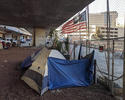By now, everyone who's paid attention to the Trump Administration lately knows that the suburbs, however defined, look to figure very prominently in the 2020 presidential election. read more »
Middle Class
Let's Stop Shaming the Suburbs
I have been a New Yorker for over a decade now, but I have spent the past few months in the Hampton Roads region of Virginia, since it’s a little easier on our family during the pandemic. Locals joke that it’s a “suburb of nowhere,” and it’s true that the region may lack some of the density and sizable cultural institutions that define the New York experience—24/7 amenities, robust public transit, and the sidewalk ballets. But the tidewater region is anything but an isolated wasteland, and spending time here has been absolutely lovely. read more »
- Login to post comments
Why the 2020 Election Will be Decided in Suburbia
American politics is increasingly about dueling geographies. Democrats have become the party of the nation’s cities, while the Republican Party finds its base in rural, small town and low-density exurban America read more »
- Login to post comments
Three Things Trump is Getting Right and Democrats Ignored
Right on cue, the country’s dominant political and media voices, after wildly applauding Joe Biden and Kamala Harris, have responded to Donald Trump’s week in the spotlight with laughter, derision and anger for its supposed amateurism, lack of star power, and racism. read more »
- Login to post comments
The Rust Belt's Strange Demographics
Many Heartland cities continue to suffer the after effects of deindustrialization. One of them is South Bend, Indiana, the former mid-sized automobile manufacturing center home to the now defunct Studebaker. read more »
- Login to post comments
The Heartland's Revival
For roughly the past half century, the middle swath of America has been widely written off as reactionary, backward, and destined for unceasing decline. read more »
- Login to post comments
In Praise of Streetcar Suburbs, Defined and Illustrated
If there is a single American development pattern or style that I love most, it is the streetcar suburb. Bringing more of this pattern back to our cities would be a great thing. read more »
- Login to post comments
Joel Kotkin Q&A on 'The Coming of Neo-Feudalism'
Let’s start at the beginning, Joel. In talking about your new book, “The Coming of Neo-Feudalism: A Warning to the Global Middle Class,” do you literally fear that liberal capitalism is losing out to economic “feudalism”? And please put that word feudalism in a modern context for our readers. read more »
- Login to post comments
Welcome to Marquette Park
So last month I saw an article in the New York Times about the resurfacing of a video documenting a racist attack on black children in Rosedale, Queens in New York City in 1975. A group of black kids from a nearby neighborhood decided to go on a "bike hike" through surrounding neighborhoods. Little did they know they would stumble on a protest against black movement into the area. read more »
- Login to post comments
Is the California Dream Finished?
For all the persistent rhetoric from California’s leaders about this state being on the cutting edge of social and racial justice, the reality on the ground is far grimmer. read more »
- Login to post comments






















